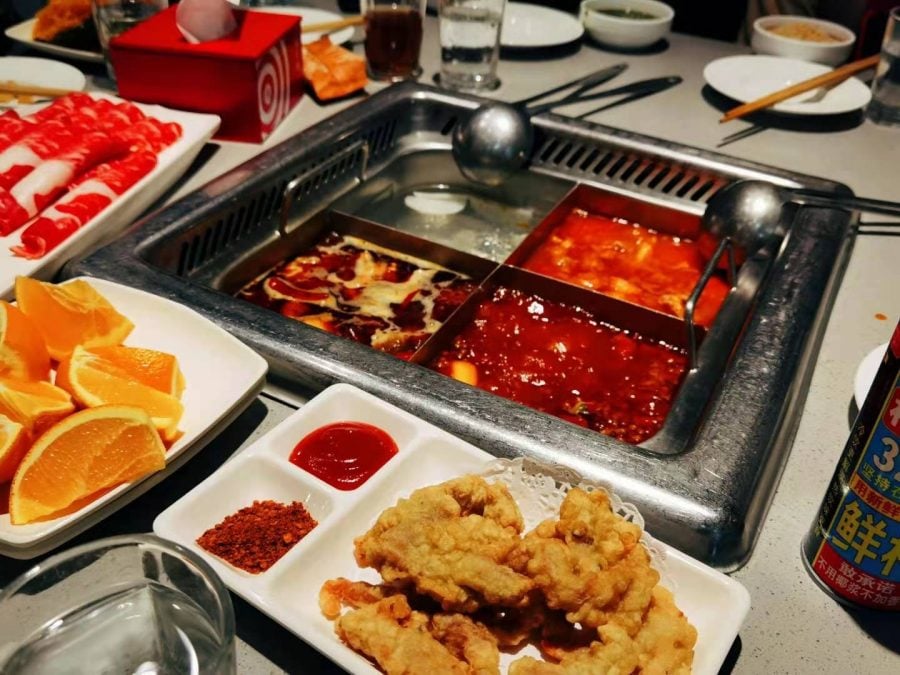Northwestern East-Asian students celebrate Lunar New Year at home
Photo courtesy of Jessica Cheng
Spicy Sichuan hotpot on Lunar New Year’s Eve.
February 14, 2021
Many of Northwestern’s East Asian international students celebrated the 2021 Lunar New Year with their family, a rare luxury after COVID-19 prevented them from returning to campus.
During a regular year, organizations like the Chinese International Student Association and Korean Student Association would host celebrations on campus, allowing students to unwind during midterms.
However, instead of celebrating on campus with her peers, Weinberg freshman Ariana Fei brought in the Lunar New Year with her parents in Beijing, China.
In most Chinese households, “tuan yuan fan” — a family reunion dinner — marks the beginning of a year of good fortune and health. To ensure a proper feast on Lunar New Year’s Eve, Chinese families make their respective restaurant reservations weeks in advance. After the reunion dinner, which takes an average of 3-5 hours, family members return home to watch the Spring Festival Gala together, a tradition similar to the Super Bowl in the United States, Fei said.
Due to COVID-19 concerns, Fei’s parents cooked their reunion dinner at home instead of dining at a restaurant in downtown Beijing. Alongside traditional Chinese dishes like Peking duck and Dezhou braised chicken, Fei’s mother created her own dish named “si ping ba wen” — a combination of four butterfish with eight pieces of choy sum, a type of vegetable commonly used in Chinese cuisines.
“In Chinese, ‘si ping ba wen’ has the connotation of ‘safe and sound,’” Fei said. “The two syllables, ‘si’ and ‘ba,’ punned with the Chinese characters four and eight.”
Fei said her mother prepared the dish in hopes that its positive symbols might bring good fortune and safety to family members’ in the upcoming year.
Although Communication freshman Jessica Cheng has spent the past Lunar New Years traveling between the Northern and Southeast parts of China, where her maternal and paternal grandparents reside, she decided to spend this year’s holiday solely with her parents.
“For the next four years, I’ll be on campus and presumably buried with midterms during Lunar New Year,” Cheng said. “Given it is the most important Chinese holiday, I want to add significance to my last chance of celebrating with my parents before college.”
While juggling her exams, Cheng had limited energy for time-consuming family events. Instead, she planned to enjoy a traditional spicy Sichuan hotpot on Lunar New Year’s Eve while streaming the Spring Festival Gala and video chatting with close friends.
For Korean international students, Lunar New Year is also one of the most significant holidays for family reunion and feast preparation, Communication junior Amy Choi said.
Choi is from Seoul, South Korea, where she said the Lunar New Year celebration lasts for three consecutive days. Families prepare a feast of traditional Korean cuisines to honor their ancestors.
Choi said these meals often include japchae, a dish of stir-fried glass noodles famous among Koreans and foreigners alike, a sliced rice cake soup called Dduk guk, and kimchi. After the reunion dinner, Korean families occasionally play games, like Yut Nori, a tokens and sticks’ board game.
However, South Korea has restricted gatherings to five people in response to COVID-19. Choi said her extended families alternated their visits this year to abide by the government regulations and avoid a potential fine.
“Instead of the format, I think it’s more the meaning of the Lunar New Year that matters,” Choi said. “The fact that all of our family members can get together and see each other’s faces — I think that’s more so the point of what Lunar New Year holiday has become in modern days now.”
Email: jingwenyang2024@u.northwestern.edu
Twitter: @Lynn53723658
Related Stories:
— Evanston Eateries Celebrate Lunar New Year
— Evanston Chinese restaurants will host Lunar New Year celebrations this weekend



